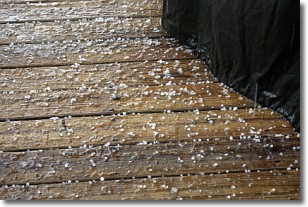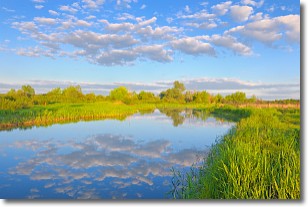Weather Alert in New Mexico
Fire Weather Watch issued May 12 at 4:02AM MDT until May 13 at 9:00PM MDT by NWS El Paso Tx/Santa Teresa NM
AREAS AFFECTED: Southwest Deserts and Lowlands
DESCRIPTION: ...EXTENDED DURATION OF CRITICAL TO EXTREME FIRE WEATHER CONDITIONS AREAWIDE MONDAY THROUGH WEDNESDAY... .Approaching low pressure system moving on shore over the Pacific Northwest will induce stronger flow aloft across the Desert Southwest this week. The currently present ridge of high pressure will begin breaking down today, with winds strengthening across the southwest deserts and lowlands amongst very low humidity. Winds will strengthen further Tuesday through Wednesday areawide, with gusts around 50 mph common in the afternoon. Already present dry air will create critical to extreme fire weather conditions for southern New Mexico and far west Texas for both Tuesday and Wednesday. ...FIRE WEATHER WATCH NOW IN EFFECT FROM TUESDAY MORNING THROUGH TUESDAY EVENING FOR CRITICAL TO EXTREME FIRE WEATHER CONDITIONS FOR SOUTHERN NEW MEXICO AND FAR WEST TEXAS... ...FIRE WEATHER WATCH IN EFFECT FROM WEDNESDAY MORNING THROUGH WEDNESDAY EVENING FOR CRITICAL TO EXTREME FIRE WEATHER CONDITIONS FOR SOUTHERN NEW MEXICO AND FAR WEST TEXAS... The National Weather Service in El Paso Tx/Santa Teresa has issued a Red Flag Warning for Elevated to Critical fire weather conditions across the lowlands of Southwest New Mexico, which is in effect from 2 PM to 8 PM MDT Monday. A Fire Weather Watch has also been issued for Critical and Extreme fire weather conditions for both Tuesday and Wednesday. * AFFECTED AREA...Fire Weather Zone 111 Southwest Deserts and Lowlands/Las Cruces BLM/GLZ. * TIMING...Monday and Tuesday afternoon and evening. * WINDS...West 20 to 30 mph with gusts up to 40 mph for Monday; 25 to 35 mph with gusts up to 55 mph for Tuesday and Wednesday. * RELATIVE HUMIDITY...As low as 8 percent. * TEMPERATURES...Up to 93. * EXPERIMENTAL RFTI...4 to 5 or Critical on Monday and 6 to 7 or Critical to Extreme on Tuesday and Wednesday. * IMPACTS...Any fires that develop will likely spread rapidly. Outdoor burning is not recommended.
INSTRUCTION: A Red Flag Warning means that critical fire weather conditions are either occurring now, or will shortly. A combination of strong winds, low relative humidity, and warm temperatures can contribute to extreme fire behavior. A Fire Weather Watch means that critical fire weather conditions are forecast to occur. Listen for later forecasts and possible Red Flag Warnings.
Want more detail? Get the Complete 7 Day and Night Detailed Forecast!
Current U.S. National Radar--Current
The Current National Weather Radar is shown below with a UTC Time (subtract 5 hours from UTC to get Eastern Time).

National Weather Forecast--Current
The Current National Weather Forecast and National Weather Map are shown below.

National Weather Forecast for Tomorrow
Tomorrow National Weather Forecast and Tomorrow National Weather Map are show below.

North America Water Vapor (Moisture)
This map shows recent moisture content over North America. Bright and colored areas show high moisture (ie, clouds); brown indicates very little moisture present; black indicates no moisture.

Weather Topic: What is Sleet?
Home - Education - Precipitation - Sleet
 Next Topic: Snow
Next Topic: Snow
Sleet is a form of precipitation in which small ice pellets are the primary
components. These ice pellets are smaller and more translucent than hailstones,
and harder than graupel. Sleet is caused by specific atmospheric conditions and
therefore typically doesn't last for extended periods of time.
The condition which leads to sleet formation requires a warmer body of air to be
wedged in between two sub-freezing bodies of air. When snow falls through a warmer
layer of air it melts, and as it falls through the next sub-freezing body of air
it freezes again, forming ice pellets known as sleet. In some cases, water
droplets don't have time to freeze before reaching the surface and the result is
freezing rain.
Next Topic: Snow
Weather Topic: What are Stratocumulus Clouds?
Home - Education - Cloud Types - Stratocumulus Clouds
 Next Topic: Stratus Clouds
Next Topic: Stratus Clouds
Stratocumulus clouds are similar to altocumulus clouds in their
fluffy appearance, but have a slightly darker shade due to their additional mass.
A good way to distinguish the two cloud types is to hold your hand out and measure
the size of an individual cloud; if it is the size of your thumb it is generally
an altocumulus cloud, if it is the size of your hand it is generally a
stratocumulus cloud.
It is uncommon for stratocumulus clouds to produce precipitation, but if they do
it is usually a light rain or snow.
Next Topic: Stratus Clouds
Current conditions powered by WeatherAPI.com




